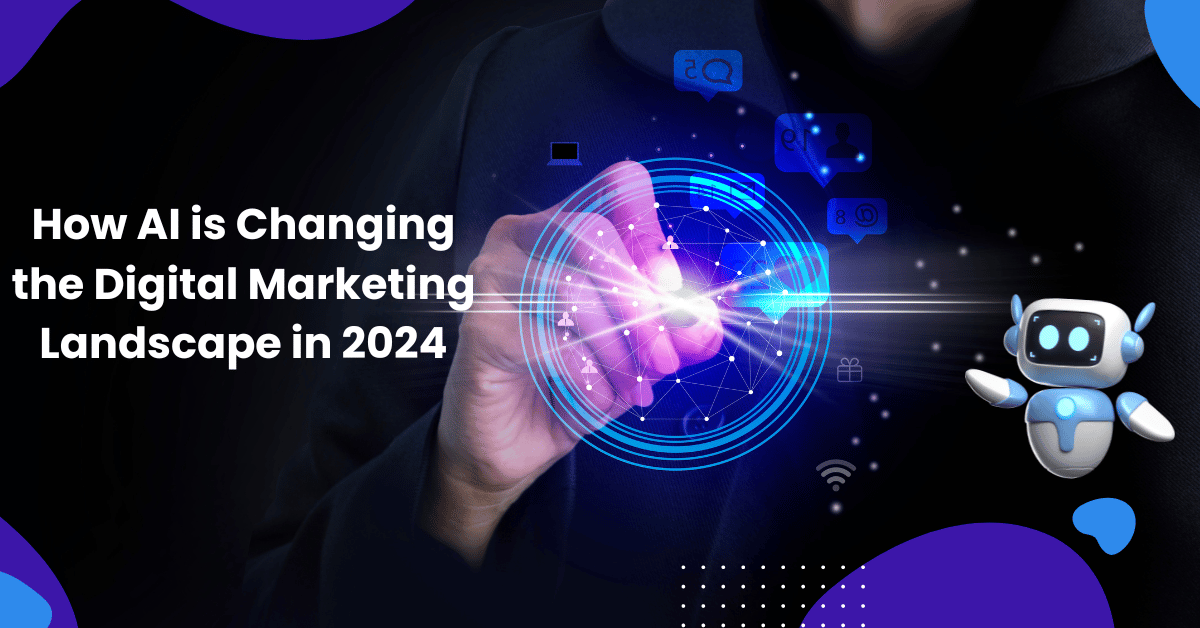
Landscape in 2024
Artificial intelligence (AI) is having an exponentially greater impact in the ever-changing field of digital marketing. By 2024, this innovative technology will have established its place as an essential tool for innovation, changing tactics and industry standards for success. Artificial Intelligence (AI) has completely changed how brands interact with consumers, predict trends, and maximize campaigns. It has done this through the creation of personalised content and predictive analytics.
AI in Digital Marketing: Where It Is Right Now
AI is already driving a wide range of applications in the digital advertising space, having made substantial breakthroughs. Just a few examples of the amazing advancements in audience targeting and campaign effectiveness made possible by this revolutionary technology are targeted advertising, dynamic pricing, and content optimisation.
One compelling illustration of AI’s impact comes from the experience of a seasoned digital marketer. When managing complex accounts, they often invest considerable time manually reviewing each ad set and ad group for underperforming ads. However, with the integration of AI, they build a reporting tool that automatically identifies when an ad has collected enough data for review and suggests when to pause an ad due to performance issues. This simple yet impactful application of AI has saved the marketer countless hours of work each week.
1. Customized Experiences at Scale
AI-driven personalisation enables brands to deliver content tailored to each users’ preferences and interests in real-time across various touchpoints. This enhances the user experience, builds brand loyalty, and encourages repeat business.
2. AI and Automated Ad Placement
AI-powered automation has revolutionised the ad buying process, making it more efficient and cost-effective. Programmatic advertising platforms driven by AI automate the buying, placement, and optimization of ads in real-time, based on audience demographics, behavior, and context. This ensures that ads reach the right people at the right time, as efficiently as possible.
3. Exploring Voice and Visual Search
Voice and visual search offer new opportunities to engage with consumers in a more natural and intuitive way. By optimising content and advertising for these search methods, brands can maintain their visibility and relevance in a competitive landscape.
4. Chatbots: Improving Customer Engagement
Using natural language processing and machine learning, chatbots interact with users in real-time, offering personalised recommendations, answering questions, and assisting them through the purchase journey. This enhances the customer experience, drives conversions, and increases sales.
The Challenges and Limitations of AI
While integrating AI into advertising workflows can significantly enhance metrics such as click-through rates, conversion rates, and overall return on investment, there are still limitations and challenges to overcome. Ethical and data privacy concerns, as well as the need for more advanced algorithms to manage complex consumer behaviors, are key issues that need to be addressed.
Ethical and Privacy Concerns
As AI becomes more widespread in digital advertising, concerns about consumer privacy and data protection are increasing. Navigating regulatory frameworks and ethical considerations is crucial for maintaining transparency and building consumer trust.
Expert Advice on Privacy and AI
A seasoned marketer recommends consulting legal professionals regarding privacy and AI. Given the substantial changes in privacy laws in recent years, ensuring continuous compliance is essential to avoid costly mistakes. Additionally, the marketer emphasizes educating the team on AI and data privacy, extensively using opt-ins and opt-outs on websites, and enforcing transparent data usage policies within the organization.
Preparing for Future Innovations
The digital marketing landscape is set for further advancements in AI technologies, including natural language processing and sentiment analysis, which will drive more sophisticated advertising strategies beyond 2024. These innovations could revolutionize consumer-brand interactions and redefine advertising standards.
To prepare for these innovations, marketers must embrace current AI-driven methodologies and continually adapt to the evolving digital advertising landscape. Staying informed about emerging technologies and evolving ethical practices is imperative for those aiming to thrive in an increasingly competitive environment.
The Rise of AI-Powered Marketing Tools
The growing prevalence of AI in digital marketing has led to a surge in innovative tools empowering marketers to streamline workflows, enhance creativity, and achieve better results. From content generation to data analysis and personalization, these AI-powered solutions are transforming how businesses engage with their target audiences.
1. Jasper: Crafting Brand-Aligned Content
Jasper is a powerful AI-driven tool that assists with online marketing strategies. By analyzing a brand’s style guide and existing content, Jasper generates copy and content in the brand’s unique voice, making it invaluable for creating advertisements and landing pages.
2. ChatGPT Plus: Unlocking Personalised Experiences
ChatGPT Plus, an advanced natural language AI tool, offers versatile capabilities for online marketing, including content writing, natural language understanding, sentiment analysis, and customer behavior prediction. This tool enables marketers to create personalised experiences for all visitors, resulting in increased customer satisfaction and engagement.
3. ElevenLabs: Revolutionizing Audio Content Creation
ElevenLabs is a groundbreaking AI tool that allows marketers to create voiceovers and other audio content using text-to-speech technology. This solution is particularly valuable for businesses focused on video marketing or podcasting/audiobook production, streamlining the audio content creation process.
4. Opus Clip: Effortless Video Production
Opus Clip is a versatile AI-powered tool designed for online marketing professionals, offering advanced video creation and editing capabilities. With Opus Clip, marketers can easily craft engaging, professional-grade videos for social media campaigns, advertisements, and website content byleveraging AI features for automated video editing, captioning, and customisation.
Conclusion
As the digital marketing landscape continues to evolve, AI’s role will become increasingly significant and transformative. Marketers who adopt this technology and strategically utilise its capabilities will be well-positioned for success in the future.
By leveraging AI, businesses can gain deeper insights, make data-driven decisions, enhance customer experiences, and achieve higher ROI. However, it is essential to address the challenges and limitations of AI, such as ethical concerns, data privacy issues, and the need for human creativity and oversight.
To prepare for the future of digital marketing, marketers must stay updated on emerging AI technologies, continuously learn and adapt, and responsibly integrate these innovations into their workflows. By embracing AI’s transformative potential, digital marketers can achieve new levels of efficiency, creativity, and success in the years ahead.
If you also wish to benefit from Digital marketing to escalate your sales, do not hesitate to contact us.
Our team of professionals can offer tailored advice and support to help your company succeed in the cutthroat field of Digital Marketing.

Comments are closed